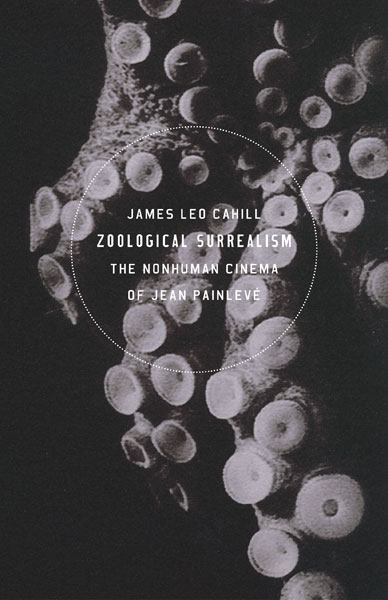Lecture & Seminar by James Cahill

Lecture & Seminar by James Cahill
The Nonhuman Cinema of Jean Painlevé: An Argument in 21 Pictures
James Leo Cahill
3:30-5:30pm
October 17, 2019
2114/2118 HJ Patterson Hall
Who was Jean Painlevé and what does a careful study of his short, surreal scientific and animal films offer to the way we approach film history and film theory? This talk answers these questions through a synoptic pass through my new book Zoological Surrealism (University of Minnesota Press, 2019) in 21 archival images. Through the bias of Painlevé's early oeuvre, I rethink the entangled histories of cinema, Surrealism, and contemporaneous scientific research, and the value of such a trans-contextual approach for the history and historiography of cinema. I also make a theoretical argument about photographic and cinematic media, and what I call cinema's Copernican vocation, or the use of the cinematic apparatus as an instrument of scientific discovery (Painlevé worked in research laboratories documenting biological phenomena and experiments) and nonanthropocentric displacement (his work also played a key role in the development of a sceptical anthropology in France).
___
La Caméra Voyageuse: For a Theory of Cinematic Exploration
10:30am-12:30pm
October 18, 2019
Tawes Hall
If cinematic media may be understood to have a Copernican potential, whereby they may be used as instruments of scientific discovery and displacement of anthropocentric perspectives, how does such a potential change how one conceives of the world or even constructs—or for the historian reconstructs—new ones?
James Cahill will lead the discussion of two of his essays, "Cinema's Natural History" (Journal of Cinema and Media Studies 58, Number 2, Winter 2019) and "La Caméra Voyageuse: For a Theory of Cinematic Exploration" (work-in-progress).
If you would like to participate in the seminar and wish to receive PDF copies of the two essays, please contact Luka Arsenjuk (arsenjuk@umd.edu).
___
James Leo Cahill is Director of the Cinema Studies Institute and Associate Professor of Cinema Studies and French at the University of Toronto, General Editor of Discourse: Journal for Theoretical Studies of Media and Culture, and co-chair of the Toronto Film and Media Seminar. He has been a research fellow at the Camargo Foundation in Cassis, France, as well as a Visiting Professor at the Franke Institute for the Humanities/Mellon Center for Disciplinary Innovation at the University of Chicago. He is author of Zoological Surrealism: The Nonhuman Cinema of Jean Painlevé (University of Minnesota Press, 2019), and is presently working on a monograph on cinema and literature of exploration in France from The Little Prince (1943) to The Planet of the Apes (1963).

